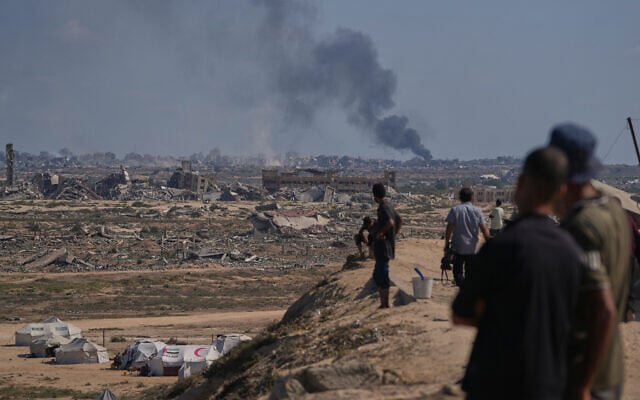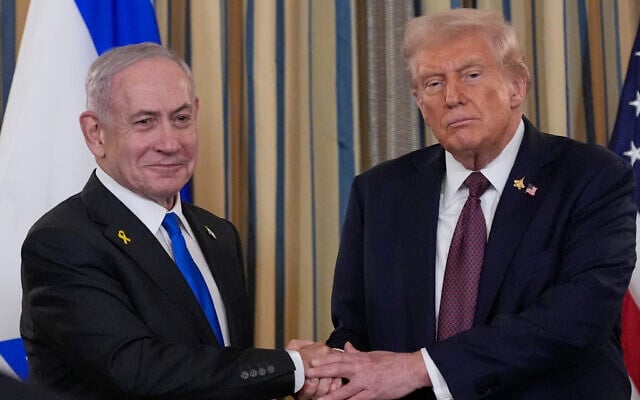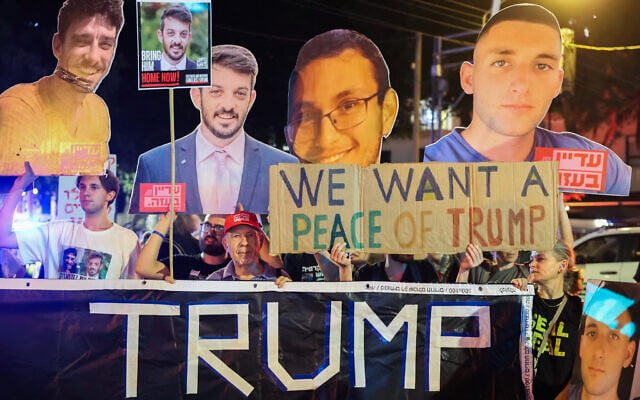

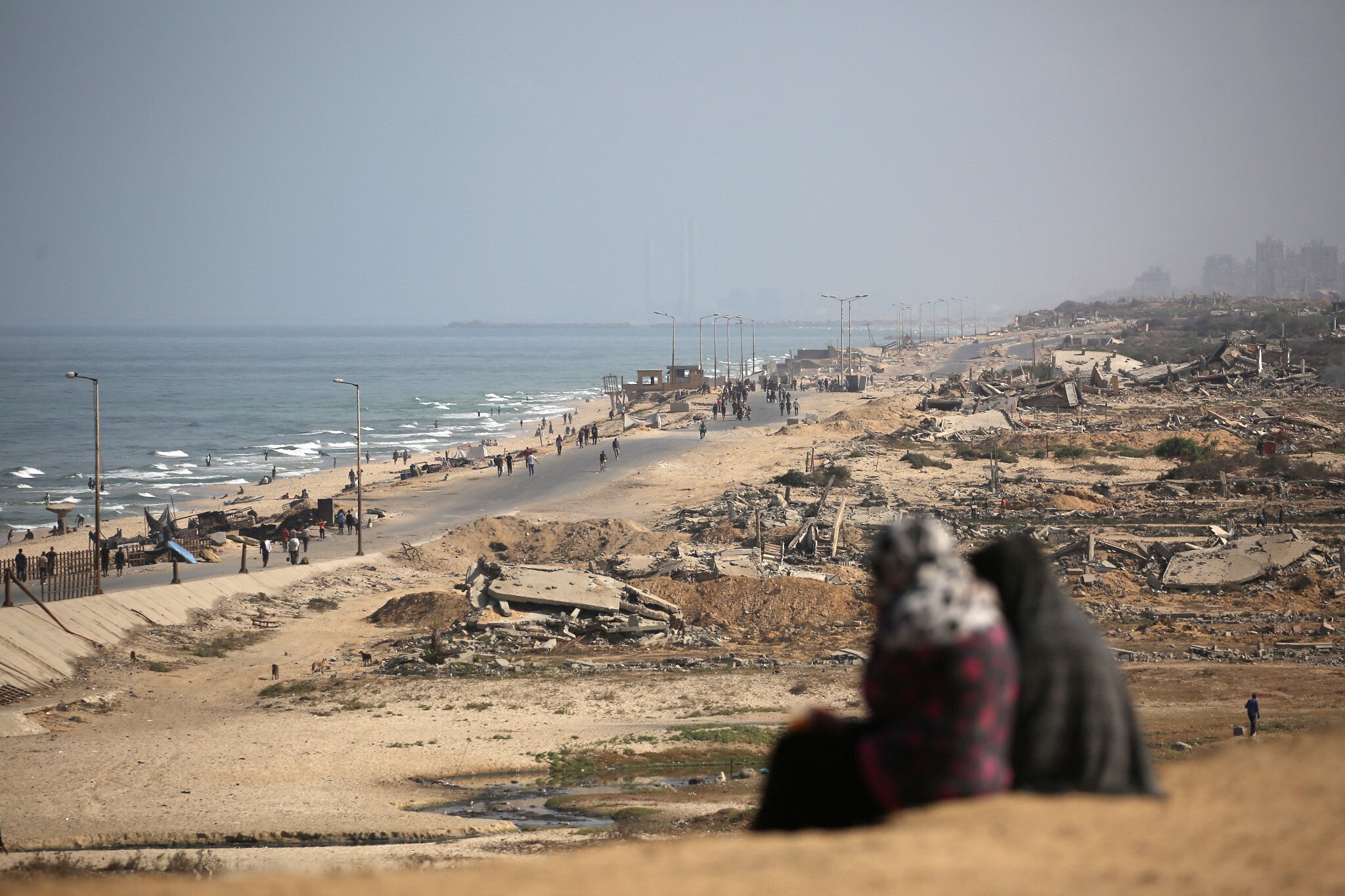
The Israel Defense Forces was ordered to halt its offensive to capture Gaza City on Saturday after US President Donald Trump said his Gaza truce plan was accepted by Hamas and called on Israel to stop bombing the Strip. The military was still engaged in defensive operations and warned Palestinians not to try to return to the besieged city, saying it remained a “dangerous war zone.”
The order by the political echelon came as Israel prepared to dispatch ceasefire-hostage negotiators, with reports saying that talks could start as soon as Sunday, most likely in the Egyptian Red Sea resort of Sharm el-Sheikh. US Middle East Envoy Steve Witkoff was said to be heading to the region.
Prime Minister Benjamin Netanyahu was said to regard Hamas’s response as ‘mainly negative,’ but saw no option other than to go along with Trump’s efforts
The Times of Israel learned that the order to the IDF was issued after overnight talks between Israeli and US officials and called for military activities to be reduced to a minimum, with troops on the ground strictly carrying out defensive operations, including strikes against threats to forces.
Troops continue to encircle Gaza City. The meaning of the order is that Israeli troops operating in Gaza City would not be advancing further, but would not be withdrawing either. The IDF dispatched additional Israeli Air Force drones to monitor the area to ensure troops do not come under attack amid the pause in offensive activity.
The Hamas civil defense agency reported “dozens of air strikes and artillery shelling on Gaza City and other areas in the Strip,” destroying 20 homes and killing at least four people in Gaza City’s Tuffah neighborhood and two children in the area of Khan Younis in the Strip’s south.
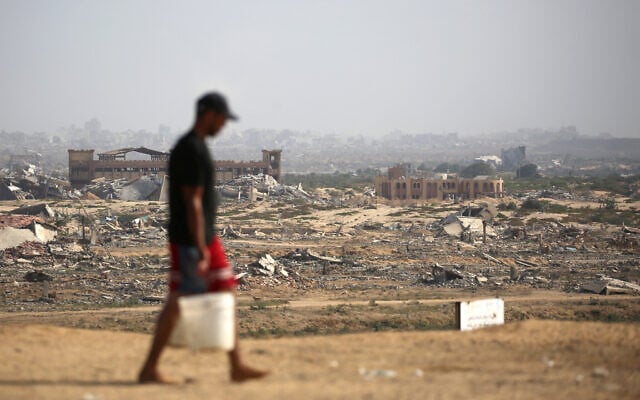
The figures could not be verified, nor was it clear when the strikes took place in relation to Trump’s call for Israel to stop bombing Gaza.
The IDF on Saturday morning also warned Palestinians against approaching troops in all parts of Gaza or returning to Gaza City, whose residents had been urged to evacuate en masse ahead of the IDF operation to capture the city.
“IDF troops are still encircling Gaza City, and returning there is very dangerous,” said the military’s Arabic-language spokesman Col. Avichay Adraee, adding that the area north of the Wadi Gaza stream is a “dangerous combat zone.”
“For your safety, avoid returning north or approaching areas where IDF troops are operating anywhere in the Strip — even in its south,” he added.
Trump said late Friday that Hamas was “ready for a lasting PEACE,” after the terror group welcomed parts of his proposal, while hinting at resistance to other sections and saying further negotiations were needed to finalize details of the hostage exchange.
“Israel must immediately stop the bombing of Gaza, so that we can get the hostages out safely and quickly!” Trump wrote Friday on Truth Social, reportedly surprising Netanyahu, who Channel 12 said considered the Hamas response a rejection of the ceasefire plan.
“They see it mainly as a negative response,” the Channel 12 report said citing people in Netanyahu’s circle. “But they are going along with Trump’s efforts because they see no other option.”
Channel 12 reported that people close to Netanyahu were briefing that the prime minister was surprised by Trump’s immensely positive response to what was a conditional and ambiguous Hamas acceptance of his September 29 proposal.
Netanyahu convened an emergency consultation meeting overnight after Trump’s statement, but did not include far-right ministers Bezalel Smotrich and Itamar Ben Gvir, Hebrew media reported
The unsourced reports published by multiple outlets said that the meeting was attended by security chiefs, Defense Minister Israel Katz, and Strategic Affairs Minister Ron Dermer. The reports said that Smotrich and Ben Gvir, who oppose ending the war, were not invited.
The Channel 12 report also noted that Netanyahu has a political interest in being seen to be consenting to move ahead reluctantly, rather than enthusiastically, given his coalition’s two far-right parties’ firm opposition to ending the war.
The report said that the fact that Trump has already pressed Israel into halting its offensive operations in Gaza means that Israel has an interest in quickly finalizing the vital first stage of the deal, which provides for the release of all hostages in the first 72 hours of the agreement — both because Israel wants those hostages freed and because it would want to resume offensive operations right away if Hamas reneges or plays for time.
Channel 12 said the assessment in Israel is that Hamas was likely to raise objections and seek assurances regarding further elements of the agreement, notably regarding post-war Gaza, during the soon-to-be-convened talks on the initial phase of hostage releases and IDF withdrawals, and that this is likely to “further complicate the process.”
Trump announced the plan on Monday in a joint press conference at the White House with Netanyahu, who endorsed the proposal. Following Trump’s Friday post, Netanyahu’s office said in a rare Shabbat statement overnight that it was “prepared for the immediate implementation of the first stage of Trump’s plan for the immediate release of all the hostages.”
“We will continue to work in full cooperation with the president and his team to end the war in accordance with the principles laid out by Israel, which correspond with Trump’s vision for ending the war,” said Netanyahu’s office, without addressing Trump’s call to stop bombing Gaza.
The IDF said in a statement soon afterward that, “per the orders of the political echelon,” Chief of Staff Lt. Gen. Eyal Zamir instructed troops to gear up “for the implementation of the first stage of Trump’s plans to free the hostages.”
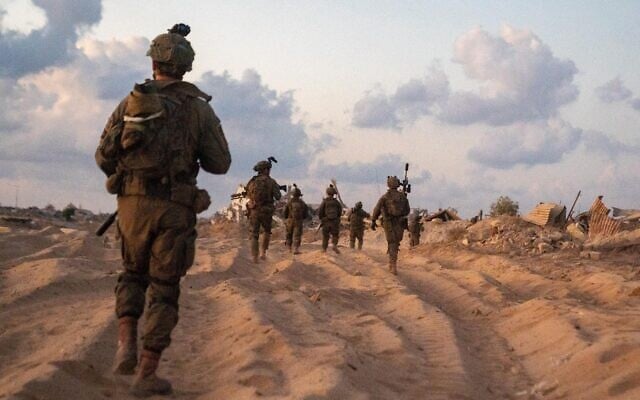
Without saying what the order entailed, the army said Zamir issued the order after meeting with top generals for “a special situational assessment in light of the developments.”
“The security of our forces is of supreme importance, and all the IDF’s capabilities will be allocated to Southern Command to defend our forces,” said the military.
The statement appeared to confirm that the military was ordered to carry out only defensive operations and halt its operation to take over Gaza City.
“The chief of staff emphasized that in light of the operational sensitivity, forces must demonstrate increased readiness and awareness. Likewise, the need for a quick response to remove any threat was clarified,” the statement added.
Three IDF divisions have been carrying out an offensive in Gaza City in recent weeks. Two more divisions were conducting defensive operations in the Strip’s north and south.
Hebrew media reported that Israel’s hostage-ceasefire negotiators were ordered to prepare to leave for talks that could start as soon as Sunday. Hebrew media said the talks would most likely be hosted by Egypt.
The reports said Witkoff was on his way to Egypt, and that Israel’s negotiating team will be headed by Dermer.
A senior Hamas official also said that Egypt will organize a conference for Palestinian factions to decide on the post-war future of the Gaza Strip.
Egypt will host an “intra-Palestinian dialogue on Palestinian unity and the future of Gaza, including the administration of the Gaza Strip,” the official told AFP.
In preparation for “accelerated negotiations” with Hamas, Israeli security officials have begun to make a list of the Palestinian prisoners to be released, and negotiators were drawing out maps of Israel’s withdrawal, whose dimensions are not yet agreed upon, Channel 12 reported.
According to Trump’s plan, Israel is to withdraw in three phases, the first of which would be “to prepare for a hostage release” and the next two of which would come as a transitional authority takes control of Gaza.
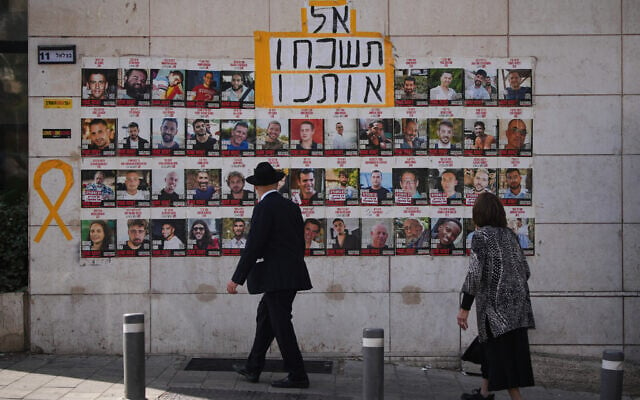
Without citing a source, the Channel 12 report said Israel wanted the focus of the talks to be on the hostage release and to delay to a later stage the names of the terrorists to be released, the IDF withdrawal lines and the meaning of the ceasefire.
However, Israel was aware that Hamas likely would try to link the first phase to contentious issues like the demilitarization of Gaza or post-war government.
An unnamed Israeli official quoted by Channel 12 said “the details are relatively simple, there is no intention to get dragged into a long negotiation.”
The official also said Israel would “show understanding” regarding technical issues preventing Hamas from returning all 48 remaining captives within 72 hours of the beginning of a ceasefire, as stipulated by Trump’s proposal.
“As long as all the living hostages are returned in that time,” said the official as a caveat.
The official also noted that should the hostage deal fall through, Israel would resume the operation in Gaza.
Hamas has repeatedly said IDF presence and other restraints could prevent the terror group from returning all the hostages immediately.
In its response to Trump on Friday, Hamas said the release of the hostages would be subject to “field conditions,” echoing its previous statements. Senior Hamas official Musa Abu Marzouk told Al Jazeera after Hamas’s statement on Friday that releasing all 48 captives in 72 hours was “unrealistic.”
However, Hamas accepted the hostage exchange formula, which would see Israel, in exchange for the captives, release 250 Palestinians serving life terms in Israel; 1,700 Gazans detained by Israel since the Hamas onslaught of October 7, 2023, which sparked the Gaz war; and the remains of 15 slain Gazans for each one of the slain hostages, of whom there are at least 26, according to the IDF.
The terror group said it was prepared to immediately “discuss the details” with mediators — apparently a reference to the still-undetermined identities of the Palestinians to be released.
Also Saturday, Palestinian Islamic Jihad, an ally of Hamas that also holds hostages, endorsed Hamas’s response to the US plan, a move that could help pave the way for the release of the captives.
“Hamas’s (reaction) to Trump’s plan represents the position of the Palestinian resistance factions, and the Islamic Jihad participated responsibly in the consultations that led to this decision,” the Iran-backed Islamic Jihad, which is smaller than Hamas but seen as more hardline, said in a statement.
The Hamas statement did not address the key issue of Hamas’s disarmament, which the US and Israel demand but the terror group has rejected. Hamas also indicated that it would partake in a future “comprehensive Palestinian national framework,” apparently clashing with the Trump plan’s stipulation that the terror group play no role, direct or otherwise, in Gaza’s post-war government.
Jacob Magid contributed to this report.


